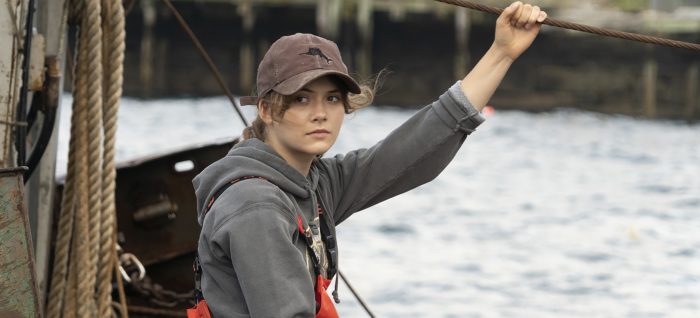
The coming-of-age genre is well-trod at this point. There are few innovations, and even fewer surprises, and yet we constantly return to it like an old song we used to love — maybe you’ve outgrown it, but you never get over the fondness for it.
Like many of its coming-of-age predecessors, Siân Heder‘s Coda hits all the familiar beats — teenager Ruby Rossi (Emilia Jones) is stuck between pursuing her dreams and staying in her hometown to help the family fishing business — but with a new variation: Ruby is the only hearing person in her deaf family, and her dream is to become a singer. It sounds like it could be an ill-advised set-up for a broad comedy (and in the original 2014 French film La famille belier that Coda is a remake of, it almost is), but Coda approaches the story with an earnestness and raw authenticity that you can’t help but be moved by this lovely little charmer.
There are two meanings to “Coda”: it’s an acronym for “Child of Deaf Adults,” and it’s the conclusion of a movement or passage — usually in a performance or a work of art. It’s between these two definitions that Ruby Rossi finds herself trapped, having dedicated all her life to being the translator for her deaf family, which includes her two parents, Frank (deaf actor Troy Kotsur) and mom Jackie (Marlee Matlin, making a welcome return to the big screen) and her older brother Leo (Daniel Durant). It’s a role that has prevented Ruby from ever getting to live out her own life, or even live a childhood free of bullying — either for having deaf parents or for spending all her free time on the family fishing boat, trudging to school smelling of fish and brine.
It’s on the fishing boat that we see meet Ruby for the first time, in a rare moment of total liberation, singing her heart out to a song on the radio while she dutifully helps her father and brother bring in their latest haul. They all but ignore her — just one of Ruby’s little quirks — except for Leo’s occasional signing of a rude remark to her, which she quickly returns to him, not missing a beat in her song. There’s a well-worn intimacy with the way the Rossi family acts with each other, the kind of easy rapport that can only be had between people who unconditionally love and trust each other. And they have to: as the only deaf fishing boat and the only deaf family in their community, it’s them against the world, and Ruby is their greatest ally as their designated hearing person who helps haggle all their wares, order all their meals, and translate all their anger at the world.
Ruby is happy to do all this for her family, whom she adores as much as they do her, but like any teen at a crossroads in their life, she starts to want more. Long bullied by her classmates except for her lone friend Gertie (Amy Forsyth), Ruby suddenly makes the unusual attempt to fit in, signing up for the high school choir, partly to get closer to her crush (Sing Street‘s Ferdia Walsh-Peelo, sporting a decent American accent) and partly to timidly pursue her passion for music. Her family and her friend can’t fathom her choice, but her choir teacher Mr. V (Eugenio Derbez, whom I don’t love, his broader performance feeling like leftover from when the film might have been a silly comedy) immediately spots her talent and encourages her to audition for Berklee.
There’s something that feels slightly dated about Coda — the multiple digs about Glee and Pitch Perfect, and what appears to be a pretty deliberate homage to Pitch Perfect‘s audition scene, feel five years too late. The movie’s barefaced sincerity, which can get corny to the point of being mawkish, also feels a little out of time — perhaps also a result of being a remake of a French film from nearly seven years ago.
But somehow, it works. Heder writes and directs Coda with a wry hand, deftly balancing moments of irreverence with its hard, dramatic moments. Heder is dedicated to portraying the deaf community with respect — even as the film is firmly in Ruby’s hearing perspective — allowing Ruby’s parents Frank and Jackie to be crass, to be loud, to be flawed, at the same time as utterly dedicated to their family. Kotsur is a standout as Ruby’s brash, randy father, prone to embarrassing his daughter by blasting gangster rap music (he likes the bass) or having a loud mid-day tryst with his wife while Ruby has her crush over for singing practice. And it’s on Kotsur and Jones’ fractious, loving relationship that the film’s emotional crux hinges: he treats her as daughter, as coworker, as ally, when all she wants is to be her own person. And in tender, profoundly moving scene that — through some clever sound design — gives us a late-film perspective shift, he starts to realize this. Jones gives a phenomenal core performance as Ruby, tremulous and vulnerable and fiery all at once, a breakout performance for the young actress (and great singer).
Coda is a sweet and unassuming melody of a film, playing into all the expectations of the coming-of-genre, before it swells into a great heave of emotion. It’s a crowd-pleaser, to be sure, and a little on the corny side, but it’s so unwavering in its sincerity that it manages to hit all the right notes.
/Film Rating: 8.5 out of 10
The post ‘Coda’ Review: A Coming-of-Age Charmer That Makes a Familiar Tune Feel New Again [Sundance 2021] appeared first on /Film.
from /Film https://ift.tt/3r3kFnF
via IFTTT
Comments
Post a Comment